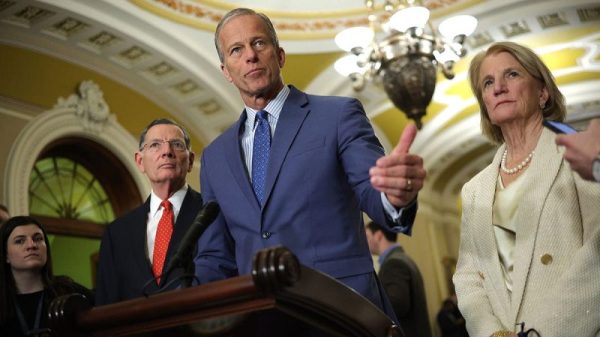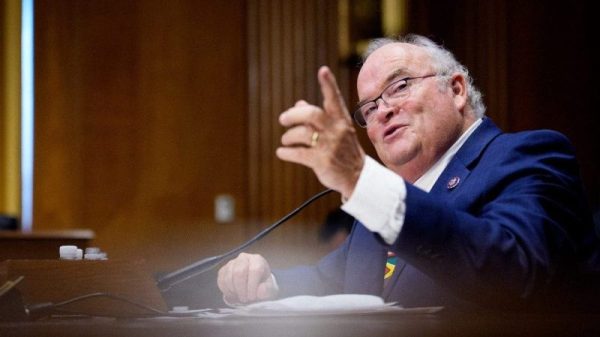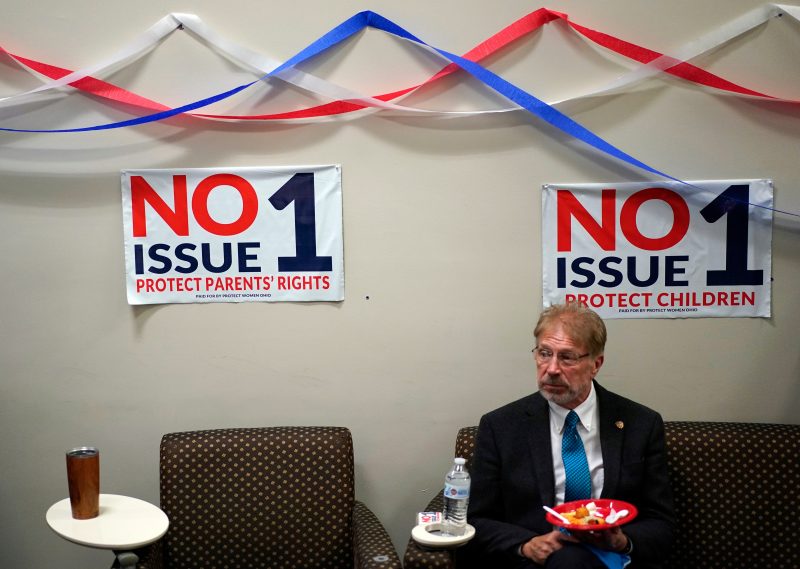After nearly 17 months of repeated defeats since the Supreme Court overturned Roe v. Wade, Republicans still have no clear strategy on how to talk about abortion, how stringent limits on the procedure should be or how to cope with the ongoing political backlash that Democrats plan to capitalize on next year, according GOP lawmakers, activists and consultants.
The latest string of losses came Tuesday as abortion rights played a role in GOP defeats in elections as varied as an abortion rights initiative in Ohio, a governor’s race in Kentucky and state legislative contests in Virginia.
In interviews and public statements, Republicans were all over the map on how to address the abortion issue heading into 2024. Republican National Committee Chair Ronna McDaniel told NBC News last week that Republicans should campaign more aggressively on the issue, calling for a “consensus as a country” that abortion should be banned with exceptions after “around 15 weeks.” Susan B. Anthony Pro-Life America released a memo suggesting that the GOP needs to “define where it stands on the issue nationally,” “put real advertising dollars behind it” and paint Democrats as extreme. Others have argued that Republicans need to emphasize support for exceptions, demonstrate more sensitivity when talking about abortion and use phrases such as “limitations” and “late-term” abortions as opposed to bans.
“The people aren’t with us,” said Sen. Kevin Cramer (R-N.D.), whose state has a near-total abortion ban. “We don’t win the debate very well publicly because we’ve sort of boiled it down to pro-life or pro-choice, as opposed to the nuance of it. … How you talk about it matters. We do have to learn how to talk about that.”
Many Republicans and antiabortion advocates say the problem is simply one of messaging that can be fixed with more moderate language, or the result of tactical errors that can be fixed with a better strategy. But Democrats — and some Republicans — say the GOP has simply backed abortion policies that are deeply unpopular with the public and tough to sell, no matter the messaging.
And some leading antiabortion advocates are already looking past 2024, suggesting that it will take more than a year to change people’s minds on the issue.
“This will take time to overcome because this is a culture change that needs to happen,” said Kristan Hawkins, president of Students for Life of America, one of the largest antiabortion groups. “I’m thinking two decades out. I’m not necessarily just focused on the next election.”
The June 2022 ruling in Dobbs v. Jackson Women’s Health Organization, which overturned Roe, marked a sweeping victory for antiabortion advocates that was nearly 50 years in the making. Yet it also sent shock waves throughout the party — dividing the GOP on where the antiabortion movement should go next, with some arguing for a national six- or 15-week ban and others saying the decision should be left to the states. Nowhere are those divisions more evident than in the GOP presidential primary, where the positions range from South Carolina Sen. Tim Scott’s embrace of a national 15-week ban to former president Donald Trump calling a six-week abortion ban in Florida a “terrible mistake” and pushing for a negotiation.
In the aftermath of the Dobbs decision, abortion rights advocates have won seven state ballot initiatives, including in the swing state of Michigan and four red states: Ohio, Montana, Kansas and Kentucky. In all five states, the abortion rights position won out in numerous counties that Trump carried in 2020.
OHIO
Nov. 7, 2023
Voters supported an amendment that enshrined the right to abortion in the state constitution.
50%
56%
In favor of abortion rights
Against abortion rights
Circles scaled according to vote margin
Counties that backed Trump in 2020
and voted in favor of abortion rights
Toledo
Cleveland
Youngstown
Akron
Canton
Dayton
Columbus
Cincinnati
100 MILES
MICHIGAN
Nov. 8, 2022
Voters supported an amendment that enshrined the right to reproductive freedom in the state constitution.
57%
Flint
Grand Rapids
Lansing
Kalamazoo
Detroit
Ann Arbor
100 MILES
MONTANA
Nov. 8, 2022
Voters rejected a state law that would have leveled criminal charges on medical workers who didn’t take extraordinary measures to save infants born under extreme conditions.
53%
Helena
Missoula
Bozeman
Billings
100 MILES
KENTUCKY
Nov. 8, 2022
Voters rejected an amendment that would have said there was no right to abortion, or any requirement to fund abortion, in the state constitution.
52%
Frankfort
Louisville
Lexington
Henderson
Bowling Green
100 MILES
KANSAS
Aug. 2, 2022
Voters rejected an amendment that would have removed the right to abortion from the state constitution.
59%
Kansas
City
Topeka
Wichita
100 MILES
Sources: Associated Press, TIGER/Line
ADRIÁN BLANCO RAMOS/THE WASHINGTON POST
OHIO
Nov. 7, 2023
Voters supported an amendment that enshrined the right to abortion in the state constitution.
50%
56%
In favor of abortion rights
Against abortion rights
Circles scaled according to vote margin
Counties that backed Trump in 2020
and voted in favor of abortion rights
Toledo
Cleveland
Youngstown
Akron
Canton
Dayton
Columbus
Cincinnati
100 MILES
MICHIGAN
MONTANA
Nov. 8, 2022
Nov. 8, 2022
Voters supported an amendment that enshrined the right to reproductive freedom in the state constitution.
Voters rejected a state law that would have leveled criminal charges on medical workers who didn’t take extraordinary measures to save infants born under extreme conditions.
53%
57%
Helena
Missoula
Bozeman
Billings
Flint
Grand Rapids
Lansing
Kalamazoo
Detroit
Ann Arbor
100 MILES
100 MILES
KENTUCKY
KANSAS
Nov. 8, 2022
Aug. 2, 2022
Voters rejected an amendment that would have removed the right to abortion from the state constitution.
Voters rejected an amendment that would have said there was no right to abortion, or any requirement to fund abortion, in the state constitution.
59%
52%
Kansas
City
Frankfort
Topeka
Louisville
Lexington
Henderson
Wichita
Bowling Green
100 MILES
100 MILES
Sources: Associated Press, TIGER/Line
ADRIÁN BLANCO RAMOS/THE WASHINGTON POST
In Ohio — where 57 percent of voters approved the Issue 1 ballot measure enshrining the right to abortion in the state constitution — state Sen. Niraj Antani (R) said millions of dollars were wasted on an unsuccessful August campaign to raise the threshold for such initiatives.
“It was a fatal strategic failure on behalf of legislative leadership in pushing for that,” Antani told The Washington Post. “Second, the ‘no’ campaign messaging was poorly done. They wasted millions on a parental rights message that very few voters actually care about. They should’ve focused entirely on how extreme Issue 1 is.”
Sen. J.D. Vance (R-Ohio) said on X, formerly known as Twitter, that Tuesday’s election results were a “gut punch” and that “We have to recognize how much voters mistrust us (meaning elected Republicans) on this issue.”
“Having an unplanned pregnancy is scary,” Vance added. “Best case, you’re looking at social scorn and thousands of dollars of unexpected medical bills. We need people to see us as the pro-life party, not just the antiabortion party.”
According to exit polls, the ballot initiative had support from 92 percent of Democrats who voted, 18 percent of Republicans and 64 percent of independents or something else.
Abortion rights advocates spent $24.9 million on media for Ohio’s ballot initiative, while antiabortion advocates spent $17.1 million, according to AdImpact. In Kentucky, Democrats spent $1.8 million on TV ads on abortion in the gubernatorial race while Republicans spent $1.1 million, according to AdImpact. In the Virginia state House races, Democrats spent $6.8 million on abortion-themed television ads, making it the top focus of TV ads, compared with $173,482 for Republicans. For the state Senate, Democrats also spent about $6.8 million on such television ads while Republicans spent $771,599.
Abortion rights advocates have focused their messaging on “personal freedom” and the “right to make your own personal medical decisions without the government getting involved,” while also highlighting personal stories, according to Rachel Sweet, an abortion rights ballot measure consultant who worked on the Ohio and Kansas initiatives.
“It has always been the case that progressive issues have typically over-performed candidates that support those policy positions,” Sweet said. “If this was a Democratic candidate, the results would look very different. But it’s not. It’s an issue and that allows us as people who work on these campaigns to really talk to voters across the political spectrum and find shared values that transcend partisanship.”
In Kentucky, for example, Gov. Andy Beshear (D) won reelection after running an ad — featuring a woman who was raped by her stepfather as a child — criticizing GOP candidate Daniel Cameron, who had supported Kentucky’s abortion ban, which didn’t include exceptions in cases involving rape or incest. “To tell a 12-year-old girl she must have the baby of her stepfather who raped her is unthinkable,” Hadley Duvall said in the ad.
In Virginia, a group of GOP legislators is seeking to remove House Speaker Todd Gilbert, arguing he did not push back enough against Gov. Glenn Youngkin and his allies’ promotion of his 15-week abortion ban in television ads. “We literally ran on one of the third rails of politics,” one of the delegates told The Post, saying he raised questions about the strategy to Gilbert months ago.
For decades, polls found most Americans opposed overturning Roe and, since the Dobbs decision, polls have consistently found more than 6 in 10 Americans opposed to the decision, with around half of the country “strongly opposed.” A September Washington Post-ABC News poll found that 64 percent opposed the Supreme Court eliminating the constitutional right to have an abortion, while 30 percent supported it.
As some antiabortion advocates push for a 15-week ban, polls show the public ranges from narrowly supportive to narrowly opposed depending on question wording and including whether exceptions are described. A Fox News poll from April 2023 found that 54 percent favor and 42 percent oppose “a law banning abortion after 15 weeks of pregnancy, except in the case of a medical emergency.” Recent polls by AP-NORC and Marquette Law School found between 51 percent and 53 percent opposing a 15-week abortion restriction.
In Virginia, an October Washington Post-Schar School poll found that Virginians were evenly divided on a 15-week ban with exceptions for rape, incest or when the woman’s life is in danger.
Wednesday’s GOP presidential debate further highlighted the lack of cohesion within the party for how to move forward on abortion. Florida Gov. Ron DeSantis, who signed a six-week abortion ban in his state, acknowledged the setbacks Republicans have faced on ballot initiatives, saying, “You got to do a better job on these referenda, I think of all the stuff that’s happened to the pro-life cause they have been caught flat-footed on these referenda.” Meanwhile, former U.N. ambassador Nikki Haley reiterated her call to find “consensus,” noting that there are not enough votes in the Senate to ban abortion nationally.
“As much as I’m pro-life, I don’t judge anyone for being pro-choice, and I don’t want them to judge me for being pro-life,” Haley said at the debate. Haley’s answer on abortion has drawn praise from some Republicans who see it as a model for talking about the issue.
“Nikki Haley I believe has the right view on this, at this point understanding how the political landscape has changed on this,” said Alice Stewart, who has worked on several GOP presidential campaigns. “Ever since Roe v. Wade was overturned, every time abortion was a single issue on a ballot, the pro-life community lost. We can continue to fight the same battle and continue to lose or we can reframe the battle and win, and the way we do that is by having responsible conversations about meaningful abortion limits.”
Before Tuesday’s election results, Senate Republicans received a presentation in September — obtained by The Post — from a GOP pollster on abortion. The presentation said that the Dobbs decision “recharged the abortion debate and shifted more people (including some Republicans) into the anti-Dobbs ‘pro-choice’ camp.” The presentation highlighted that voters “strongly support” exceptions to abortion bans. It also noted that voters view “pro-life” as a “flat ban on abortion without exceptions” and “pro-choice” as supporting “varied levels of restrictions.”
The presentation recommended that Republicans “clearly articulate support for exceptions”; “own the center with support for reasonable abortion restrictions”; “highlight liberals’ extremism including — voting for no abortion restrictions”; and “bridge to safety net policies like adoption and support for young families.”
Steven Law, CEO of the Senate Leadership Fund, the super PAC aligned with Senate Minority Leader Mitch McConnell (R-Ky.), presented those findings at a September Susan B. Anthony List donor event, according to a person familiar with the matter, who spoke on the condition of anonymity to discuss internal strategy. The National Republican Senatorial Committee is also encouraging Republicans to convey a similar message, emphasizing support for “reasonable limits on late-term abortions” and the backing of exceptions for rape, incest and life of the mother, according to another person familiar with the strategy.
Sen. Shelley Moore Capito (R-W.Va.) said the country is currently “in a settling period.”
“That’s what we always tell people: You can have your voices heard at the ballot box, and I think they are,” she said. “The drastic change that the decision precipitated has caused, for women, a feeling of loss of control, whether you’re pro-life or pro-choice. So I think that’s what you’re seeing. … I think right now the states are making the decisions and we ought to see how this all settles out.”
Caroline Kitchener, Hannah Knowles, Emily Guskin and Scott Clement contributed to this report.






































